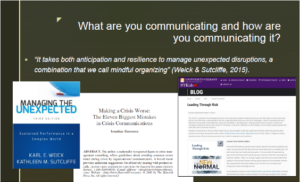Leaders’ Communications in Times of Crisis
By K. C. Wilcox
“It takes both anticipation and resilience to manage unexpected disruptions, a combination that we call mindful organizing”
(Weick & Sutcliffe, “Managing the Unexpected”, 2015).
 The COVID-19 pandemic has created what Dr. Robert Griffin, Dean and Professor of the College of Emergency Preparedness, Homeland Security and Cybersecurity, characterized as an earthquake with consequential residual effects. In the University at Albany’s “Mental Health and Education: Supporting Students, Staff and Ourselves Post-Pandemic” panel discussion on August 4th, Dr. Griffin explained that “…mental health issues are like the tsunami that comes after the earthquake”. The panel was convened by Dr. Christy Smith – Assistant Dean of the School of Education, and included a number of experts including:
The COVID-19 pandemic has created what Dr. Robert Griffin, Dean and Professor of the College of Emergency Preparedness, Homeland Security and Cybersecurity, characterized as an earthquake with consequential residual effects. In the University at Albany’s “Mental Health and Education: Supporting Students, Staff and Ourselves Post-Pandemic” panel discussion on August 4th, Dr. Griffin explained that “…mental health issues are like the tsunami that comes after the earthquake”. The panel was convened by Dr. Christy Smith – Assistant Dean of the School of Education, and included a number of experts including:
Robert Griffin, Dean of the College of Emergency Preparedness, Homeland Security and Cybersecurity
Ann Marie T. Sullivan, New York State Office of Mental Health Commissioner
Angela M. Banks, a staff psychologist at UAlbany
Melissa Them, a psychologist at HPA/LiveWell
 Much of the panel discussion focused on issues of mental health resulting from the pandemic and what educators might do to re-engage students and families going into the opening of school in the fall. While we have explored preliminary findings on stress and secondary traumatic stress in the educator workforce in previous blogs, this blog focuses on communications in a crisis.
Much of the panel discussion focused on issues of mental health resulting from the pandemic and what educators might do to re-engage students and families going into the opening of school in the fall. While we have explored preliminary findings on stress and secondary traumatic stress in the educator workforce in previous blogs, this blog focuses on communications in a crisis.
As the opening quote from scholars Weick and Sutcliffe emphasizes, leaders and educators who engage in mindful organizing and use opportunities to communicate their plans to others in strategic and mindful ways can help reduce error and mental health-related fall out.
NYKids Research on Leaders’ Communications
In NYKids’ latest study of educators’ responses to the pandemic, we have found that school leaders’ communications (including what and how they communicate) are related to educators’ levels of stress and job satisfaction and their willingness and ability to adapt to change in positive and innovative ways.
 In our analysis of hundreds of educators’ responses to our survey and follow up interviews with principals in several schools, we have found several leader communication practices relate to better experiences and attitudes among frontline education staff.
In our analysis of hundreds of educators’ responses to our survey and follow up interviews with principals in several schools, we have found several leader communication practices relate to better experiences and attitudes among frontline education staff.
While our study is ongoing, our preliminary analysis indicates the following promising practices for education leaders to consider as they prepare to lead others into an uncertain new school year.
- Anticipatory and contingency-oriented communications (if this happens, we are prepared to do XYZ) help prime others to be prepared for dynamic changes
- Quick (on-time) communications when situations and changes arise reduce stress and anxiety as people search for direction and these are supported by communication systems at the ready to convey messages with staff and the public
- Coupling of directive/problem-specifying and solving communications (this is the problem at hand, and this is what we are going to do about it) reduce the cognitive and emotional load of problem solving for others
- Motivational communications (we can and will get through this) are useful, but are best sent with messages that are concrete about what will be done, when, and by whom
- Multi-directional communications (how are you experiencing this problem and what are your ideas about solving it?) informed by those closest to the problems at hand (e.g. teachers) and with other community partners facilitates creative and effective adaptation
Next Steps to Mitigating the Mental Health Tsunami in Schools
In the face of pandemic-related uncertainty going into the 2021-22 school year, what leaders communicate and how they communicate may have drastic effects on how students, frontline educator staff, families, and community members respond.
As NYKids is finding, lessons from crisis leadership research are perhaps more relevant than ever for school leaders to consider. To learn more about this research see NYKids’ August 5th, Questar 3 sponsored presentation and check out some of the recommended resources from the Mental Health and Education panel discussion below.
Mental Health Association in NY
Substance Abuse and Mental Health Services Administration
NYS Office of Mental Health Resources for Families and Schools
Thank you for your interest in NYKids. Please visit our webpage and sign up for our newsletter. We welcome your comments and questions at nykids@albany.edu.
